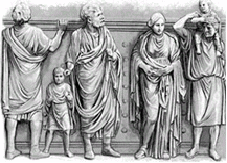 Part
3 Rome the Believer
Part
3 Rome the Believer Part
3 Rome the Believer
Part
3 Rome the Believer
The Etruscans had known of the history and fortunes of Israel. Sea kings had plied the trade winds of the Mediterranean Sea for centuries. When Rome expelled the last of the Tarquinian kings (La monarchia etrusca) from their own land 500 years before the first Caesar became Emperor, they, too, established a patriarchal society in the form of a republic (La libera res publica). Their affluence and wealth grew under the patriarchal society and, with it, the number of tradesman, servants, and slaves who immigrated to the affluence of Rome for employment. With the added population and increased wealth, the bureaucracy of government also grew.
The word “republic” is said to have come from the Latin words, Res Publica, which often translate into the words “commonwealth” or “things public”. The term’s origin was from the phrase, “La libera res publica,” used after the expulsion of kings. It is a Latin idiom meaning “free from things public” and the commonwealth wealth of the people was their individual liberty. It was a government of, for, and by the people.
The original republic was one in which a freeman was free from public authority, but was under his natural authority of the free eldest father, or Sui Juris Patronus, of his family. Each head of a family was king or prince. The ministers of the national government were “titular” in authority, meaning that they held authority “in name only.” This did not mean that they had no power, but that their power was restricted to their duties and themselves. The patriarchs were free from their public servants.
In an indirect democracy, the mob elects those that govern the whole, while, in the republic, you only elected representatives, public servants, with a limited or no authority. A Constitutional Republic grants some common authority to government, but tries to rein that power with a contract or constitution. Under a constitution where the people retain the right to contract, they may continue to individually bargain the remainder of their freedoms away.
Most of the leaders of Rome were the Patricians who were the heads of family groups. They were chosen by the tribes out of those leading elders to represent them in the Senate, meaning “old men”. Their power was limited and divided. There were also the Equestrians, who were noble knights offering protection for society. These meager offices grew in number and power under the apathy and avarice of the people.
The Commanders-in-chief
Eventually, the power of Consuls and Tribunes, the restrictions of the Twelve Tablets of Law, and a multitude of offices were added to serve the people's needs. The number and influence of statutes, rather than common law and custom, expanded as the people became comfortable and perverse. At first, this servant bureaucracy would attend to the needs and desires of the people and, eventually, eat out their substance in service to the beast of Rome.
Power begets power. The power, prestige, and popularity of Julius Caesar obtained great wealth for Rome, and for Caesar. If one man had all the responsibility and power, then liberty was dead. The Libera Res Publica had steadily changed from a free society of untaxed land owners, ruled by individual responsibility and the elders of the family units, to a culture of affluent self-indulgence, apathy, avarice, and amour propre. 1
Idolism supplanted idealism. The first charismatic character who told the people what they wanted to hear became both victimizer and victim. Caesar was a master of popular opinion, but not a master of his own greed for power.
Conservative senators murdered Caesar on the Ides of March in order to reestablish the old libera res publica, e.g. the Roman republic, where men were “free from things public”. Caesar died, but the republic also gasped its last breath. It was lost through the apathy of the people and replaced by the rule of Augustus. He was elected by the electoral college of the Senate to three offices of this new social democracy; the President of Rome, also called Principas Civitas or Princeps (elected annually), the commander-in-chief, called Emperator or Emperor (ten-year term of office), and the Appointor of gods, called Apo Theos, who appointed the judges and magistrates throughout the courts of the Empire.
“Accustomed to trampling on the rights of others, you have lost the genius of your own independence and become the fit subjects of the first cunning tyrant who rises among you.”2
The character of Rome had changed as a result of moral decay. It had now mutated through greed, indifference, and civil war. The victory of Octavius, the “Savior”3 of Rome, now called Caesar Augustus, began the spiraling decent of the Roman people into bondage.
Caesar ruled over the civil powers of a nation once composed of rugged individuals bound together by a common brotherhood. His bountiful benevolence, offering free bread in the form of a massive welfare system of entitlements, eventually turned Romans into the bread for Caesar’s own table, at which his vast bureaucracy now fed.
1Amour-propre, or Self-love, is French. A regarding of oneself with undue favor.
2Abraham Lincoln September 11, 1858.
3Augustus was hailed as the Savior of Rome and promptly elected by the electoral college of the Senate to a ten-year term of office as commander-in-chief.